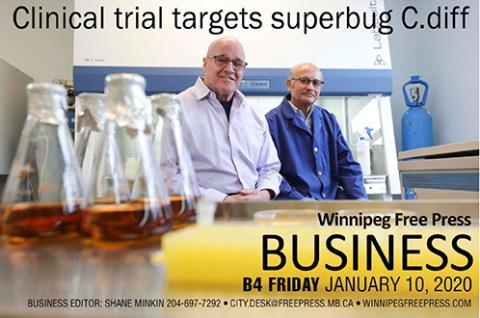
A small Winnipeg company that has been developing avian egg antibody technology since 1997 — and has been producing treatments for livestock illnesses for many years — is recruiting patients for an advanced clinical trial that could provide relief against a hard-to-treat super bug.
ImmuniMed Inc. received Canadian and U.S. regulatory approval more than two years ago for a novel treatment for C. diff. (Clostridioides difficile) the number one healthcare acquired super bug. The treatment is essentially antibody infused whole egg powder from hens that have been injected with a C. diff. vaccine.
The treatment has shown very promising results in compassionate trials that have taken place in Australia and the leading Canadian doctor who specializes in treating the illness is on board for the clinical trial.
According to the Florida-based C Diff Foundation the bacteria is the most common microbial cause of healthcare-associated infections in the U.S., costing the health care industry up to $4.8 billion each year. One out of every five patients with a healthcare-associated C. Diff. infection experienced a recurrence of the infection and one out of every nine patients aged 65 or older with a healthcare-associated C. diff. infection died within 30 days of diagnosis.
"C. diff. kills the same number of people as prostate cancer – everyone knows about prostate cancer, no one knows about C diff. And it is a very miserable infection, causing profuse diarrhea, abdominal pain, colitis and possible death. When the standard of care antibiotic treatment is unsuccessful the infection can recur, leaving the patient ill for long periods," John Hare said. (Ruth Bonneville / Winnipeg Free Press)
Often it becomes a serious gastrointestinal infection when individuals have been exposed to antibiotic therapy, and/or have experienced a long-term hospitalization, and/or have had an extended stay in a long-term care facility.
Current treatment typically involves the potent antibiotic vancomycin that has side effects and is only successful 70 per cent of the time. A treatment of last resort is a fecal transplant, the first of these unusual procedures ever held in Winnipeg took place last summer.
Dr. Thomas Louie of the Calgary's Foothills Medical Centre, one of the country's leaders in that procedure, is taking part in the ImmuniMed trial.
John Hare, CEO of ImmuniMed, said, immunologists, including some doctors taking part in the clinical trial, are still incredulous about results from some of the compassionate trials that have produced full recovery and no recurrence
"They say 'No antibiotics!' They can't understand. They are infectious disease guys and all they know is antibiotics," said Hare. "The hard part is getting people to believe."
Hare's original business J. Hare & Associates has developed a number of antibody-based products that have proven to be effective treatment for bacteria-based intestinal diseases and developed the world's first and only veterinary biologic treatment for preventing e. coli infection in baby pigs using the same avian egg antibody technology.
"We are just a small six-person company and we have been doing things on a shoestring budget so far," he said. Having said that ImmuniMed does have a Health Canada and Canada Food Inspection Agency-certified level two lab where it produces vaccines. The company raised about $1.5 million to fund the clinical trial, a pittance compared to the $1 billion-plus it typically takes to get a new drug to market form start to finish.
As well as the fact that it may be the first clinical trial using an entire processed egg as the sole agent, the fact that ImmuniMed has been able to successfully get to the phase II clinical trial stage is in itself a rarity for a Canadian company.
The C Diff Foundation lists 13 current clinical trials taking place in the U.S., some being done by the largest pharmaceutical companies in the world including Merck and Pfizer.
"C. diff. kills the same number of people as prostate cancer – everyone knows about prostate cancer, no one knows about C diff," he said. "And it is a very miserable infection, causing profuse diarrhea, abdominal pain, colitis and possible death. When the standard of care antibiotic treatment is unsuccessful the infection can recur, leaving the patient ill for long periods."
The infection hits about 500,000 and kills 30,000 North Americans every year. Hare is not getting ahead of himself, but there is the potential market of more than $500 million per year for a new effective treatment.
The clinical trial is looking to recruit 72 patients in Calgary and three Winnipeg sites, the Grace, HSC and St. Boniface Hospitals.
Since the substance used in the trial is the entirety of an egg processed down to powder form, there is no safety issues and there will not be a double-blind component to trial — some patients in the trial receiving placebo rather than the actual treatment — which is typical in many clinical trials.
Eligible patients for the trial must have only mild to moderate C. diff. symptoms, it must be the first or first recurrent C. diff. infection, no antibiotic intervention beyond 24 hours and must not have other intestinal illnesses at the time.
As well as efficacy, the trial will also help determine appropriate doses. The 72 people taking part in the study will be split evenly and take three different dosage amounts over a 10-days period. The study will include testing stool samples for an additional 70 days to determine whether or not there is any recurrence of the bacteria.
Winnipeg trial coordinator is Neil Roy, who can be reached at neil.roy@immunimed.com.
Martin Cash
Reporter
Martin Cash has been writing a column and business news at the Free Press since 1989. Over those years he’s written through a number of business cycles and the rise and fall (and rise) in fortunes of many local businesses.
